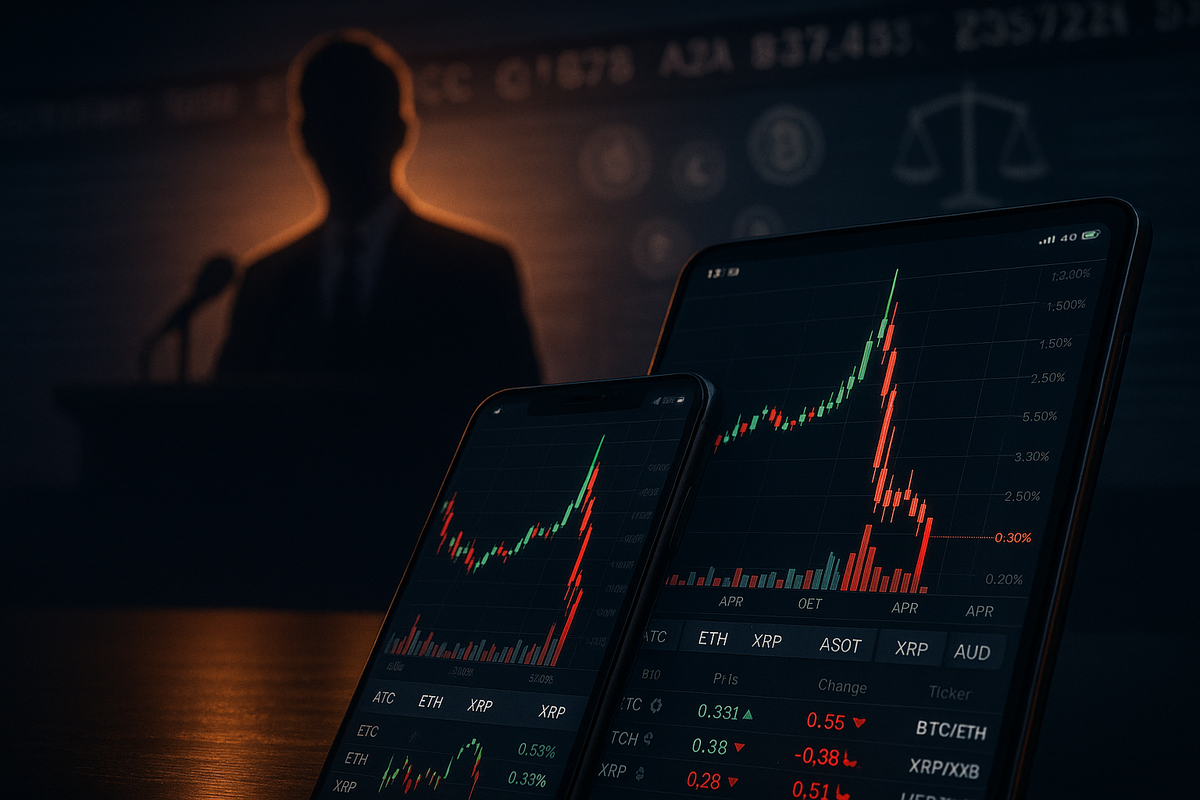
Recent revelations and accusations have cast a long shadow over Donald Trump's burgeoning involvement in the cryptocurrency market, igniting a fierce debate about market manipulation and ethical conduct. Critics, most notably prominent economist Peter Schiff, allege that Trump's strategically timed pronouncements and financial interests in various digital assets could constitute a "pump and dump" scheme, designed to artificially inflate prices for personal gain at the expense of unsuspecting retail investors. These serious claims are sending ripple effects through the crypto world, prompting calls for investigations and raising critical questions about regulatory oversight in the rapidly evolving digital finance landscape.
The controversy centers on a series of events and Trump-backed crypto ventures that have seen dramatic price swings, often coinciding with public statements or endorsements from the former President. The allegations suggest a pattern where public announcements create a surge in demand and price, followed by a significant downturn, leaving many investors with losses. This scenario has drawn the ire of financial watchdogs and market commentators alike, who fear that the intertwining of political influence with speculative assets could undermine trust and stability in the nascent crypto industry.
The Cryptocurrency Confluence: Trump's Digital Footprint and the Accusations
The saga began to unfold with heightened intensity surrounding Donald Trump's (NYSE: DJT) increasingly vocal embrace of cryptocurrency. Key events fueling the "pump and dump" allegations include his announcement of a proposed U.S. Crypto Strategic Reserve, which he stated would include prominent cryptocurrencies such as XRP (XRP), Solana (SOL), Cardano (ADA), Bitcoin (BTC), and Ethereum (ETH). Following this pronouncement, these digital assets experienced a sharp, albeit brief, rally, reversing earlier market declines. However, this surge was often followed by a significant pullback, leading to suspicions of strategic timing designed to create artificial demand.
Further exacerbating concerns are Trump's direct and indirect involvements in specific crypto projects. The launch of the $TRUMP memecoin in January 2025 saw its market valuation skyrocket to over $5 billion within hours. While initial beneficiaries included Trump's company and partners, who reportedly profited around $100 million from trading fees, forensic analyses later suggested that approximately 813,294 wallets trading $TRUMP suffered losses totaling an estimated $2 billion. Similar ethical questions have been raised regarding the Trump family's substantial ownership in World Liberty Financial's $WLFI token and its alleged role in market manipulation, with reports indicating $6.25 billion wiped out from investors since its peak. Accusations also point to wallet freezes by World Liberty Financial as potential measures to prevent selling pressure rather than legitimate security protocols. The company American Bitcoin Corp (ABTC), also linked to Trump's network, has faced scrutiny.
Economist Peter Schiff has emerged as a particularly vocal critic, directly accusing Trump of orchestrating a "pump and dump" scheme. Schiff specifically targeted the U.S. Crypto Strategic Reserve announcement, characterizing it not as a policy initiative but as a calculated maneuver to benefit insiders. He publicly labeled Trump as the "first crypto President" who "just helped pull off the biggest crypto rug pull of all time," demanding a Congressional investigation into who had advance knowledge of the announcement and urging an audit of crypto purchases and sales surrounding these events. Schiff’s calls for a probe into potential insider trading — which he states would constitute a major financial scandal if proven — underscore the gravity of these allegations. Regulatory bodies such as the SEC and CFTC are reportedly increasing their scrutiny of celebrity-backed crypto promotions, with the SEC allegedly investigating Alt5 Sigma, a crypto firm connected to Trump's network, over stock manipulation and financial misrepresentation allegations tied to a $1.5 billion deal.
A Reckoning for Investors: Unveiling Winners and Losers in the Crypto Crossfire
In the wake of these market manipulation allegations, the cryptocurrency landscape presents a stark delineation between potential winners and significant losers. At the forefront of those potentially benefiting are entities directly associated with Donald Trump's crypto ventures, including his organization and affiliated partners. Reports suggest substantial profits were garnered from the initial surge and trading fees of the $TRUMP memecoin. Similarly, the Trump family's significant stake in the $WLFI token of World Liberty Financial positions them as potential beneficiaries of any artificial price inflation. The strategic timing of announcements regarding a potential U.S. Crypto Strategic Reserve, if proven to be coordinated with prior holdings, could also have allowed insiders to capitalize on the temporary price increases of cryptocurrencies like XRP (XRP), Solana (SOL), Cardano (ADA), Bitcoin (BTC), and Ethereum (ETH).
On the opposite side of the spectrum are the myriad retail investors who, swayed by the hype and the perceived endorsement of a prominent political figure, entered the market at inflated prices. The dramatic "dump" that often follows a "pump" leaves these investors holding assets that have rapidly depreciated in value. The alleged $2 billion in losses suffered by over 800,000 wallets trading the $TRUMP memecoin and the reported $6.25 billion wiped out from investors of the $WLFI token serve as grim testaments to this phenomenon. These individuals often lack the sophisticated market insights or insider knowledge to navigate such volatile schemes, making them particularly vulnerable to the tactics described in the allegations.
Beyond individual investors, the broader credibility of the cryptocurrency market itself could suffer. While specific publicly traded companies might not be direct "winners" in a positive sense, firms involved in crypto trading platforms or blockchain analytics could see increased activity due to investigations or enhanced due diligence from investors. Conversely, the negative publicity could deter institutional investors or legitimate enterprises from entering the crypto space, fearing association with such controversies. The reputation of political figures engaging in highly speculative financial markets is also at stake, with potential long-term implications for public trust in both political and financial systems.
Industry Impact and Broader Implications: A Shifting Regulatory Tide
The allegations surrounding Donald Trump's cryptocurrency activities are not merely isolated incidents; they fit into a broader, troubling trend within the crypto industry where celebrity endorsements and speculative hype often outpace fundamental value. This event significantly magnifies existing concerns about market integrity, transparency, and the potential for manipulation in an often-unregulated digital asset space. It highlights how political influence, when intertwined with highly volatile financial instruments, can create an environment ripe for exploitation, eroding trust in both political leadership and the nascent crypto economy.
The ripple effects of these accusations are likely to be far-reaching. Competitors in the crypto space, particularly those striving for legitimacy and long-term viability, may find themselves under increased scrutiny. Legitimate blockchain projects and established cryptocurrencies could face collateral damage, as the negative headlines surrounding alleged "pump and dump" schemes might tarnish the entire industry's image, making it harder to attract mainstream adoption and investment. Partners of the entities involved, such as technology providers or marketing firms, might also face reputational risks.
Perhaps the most significant long-term implication lies in the realm of regulation and policy. The controversy is poised to intensify calls for stricter oversight of celebrity-backed crypto assets and politically linked tokens. There could be a strong bipartisan push to update federal conflict-of-interest laws, particularly concerning the financial holdings and disclosures of public officials and their families in emerging sectors like cryptocurrency. This could manifest as more stringent disclosure requirements, the mandatory use of blind trusts for certain investments, or even outright prohibitions on high-ranking officials investing in highly speculative or politically sensitive assets. Historically, similar incidents involving financial misconduct by public figures have often led to significant legislative reforms designed to enhance transparency and accountability. The current situation draws parallels to past periods where rapid technological innovation outpaced regulatory frameworks, leading to calls for new protections for investors.
What Comes Next: A Crossroads for Crypto and Politics
The immediate aftermath of these allegations will undoubtedly be characterized by intense scrutiny and calls for accountability. In the short term, expect a significant push for formal investigations by regulatory bodies such as the Securities and Exchange Commission (SEC) and the Commodity Futures Trading Commission (CFTC), potentially alongside congressional inquiries. The outcome of these investigations will dictate the legal and political ramifications, including potential enforcement actions, fines, or even criminal charges if market manipulation or insider trading is proven. For the involved crypto assets, continued volatility is likely as market participants react to every development in the ongoing saga.
In the long term, these events could serve as a pivotal moment for the cryptocurrency industry's relationship with political figures and public trust. Should the allegations be substantiated, it could fundamentally alter how political figures engage with digital assets, potentially leading to a permanent shift towards more cautious and transparent involvement, or even outright disengagement from highly speculative ventures. Regulatory bodies might accelerate efforts to close loopholes and establish clear guidelines for influencer-backed tokens and the disclosure of financial interests by public officials in emerging markets. This could create new market opportunities for platforms and projects that prioritize transparency, compliance, and genuine utility over hype.
Potential scenarios range from a robust regulatory crackdown that cleans up the "Wild West" aspects of the crypto market, fostering greater investor protection and institutional adoption, to a more fragmented and contentious environment if regulatory responses are perceived as overreaching or ineffective. Investors should closely monitor the progress of any investigations, proposed legislative changes, and the broader sentiment around celebrity and political involvement in crypto. The debate around ethical governance, market integrity, and the future of digital assets will undoubtedly be shaped by how these serious accusations are ultimately addressed.
Conclusion: A Defining Moment for Crypto Integrity
The allegations of "pump and dump" schemes and market manipulation swirling around Donald Trump's cryptocurrency ventures represent a defining moment for the digital asset landscape. They underscore the inherent risks of unregulated markets, the potent influence of high-profile endorsements, and the critical need for robust ethical frameworks, particularly when political power intersects with personal financial interests. The immediate takeaways are clear: the potential for rapid gains in speculative assets can be a double-edged sword, often leading to significant losses for retail investors, and the calls for enhanced regulatory oversight are now louder than ever.
Moving forward, the market will be keenly watching the outcomes of potential investigations. The response from regulators, legislators, and indeed, the cryptocurrency community itself, will determine whether this event serves as a catalyst for much-needed reforms or further eroding public trust. The controversy highlights the ongoing tension between innovation and investor protection, a balance that the crypto industry has continually struggled to achieve. For investors, the enduring lesson is the paramount importance of extreme due diligence, skepticism towards hype-driven assets, and a critical understanding of the motivations behind celebrity or political endorsements in highly volatile markets.
Ultimately, the lasting impact of this saga may be a renewed push for transparency and accountability, potentially leading to a more mature and resilient cryptocurrency ecosystem. What investors should watch for in the coming months are not just price movements, but rather the legislative and regulatory reactions, the outcomes of any formal inquiries, and the broader industry's commitment to self-governance and ethical conduct. The integrity of the entire digital asset space hangs in the balance as these accusations unfold.





